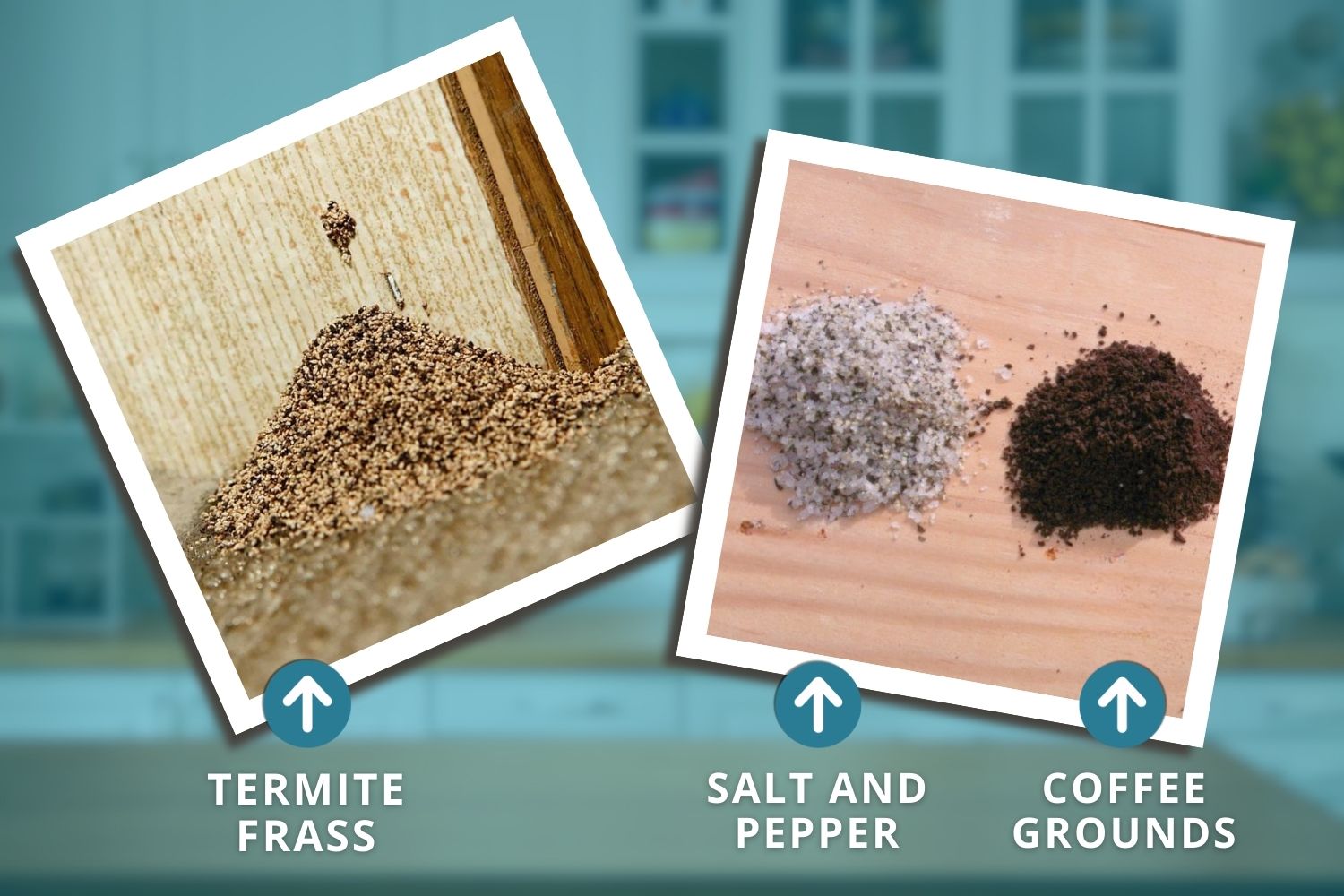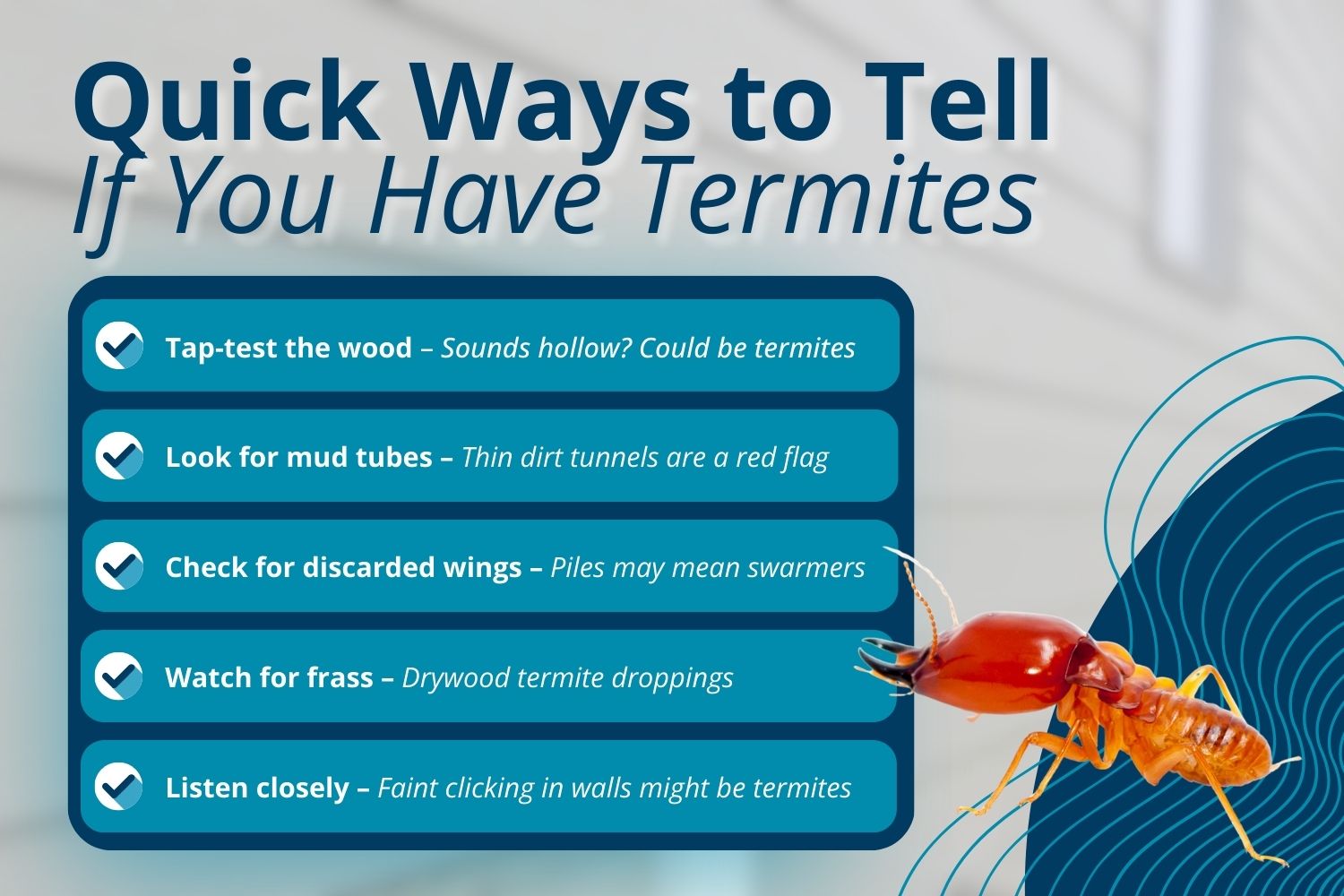Termites cause more than billions of dollars in property damage every year across the U.S., and most of that damage isn’t covered by homeowners’ insurance. They don’t make much noise, they don’t leave obvious messes, and they can go unnoticed until your floors sag or your framing starts to fail.
That’s why it’s so important to catch them early.
In this guide, we’ll walk through the most common signs of termite activity, how damage shows up, and when to bring in a professional for help.
What Termite Damage Looks Like
Termites feed on cellulose, which means they chew through the wood inside your home, quietly and persistently. Over time, their damage may show up as:
- Wood that sounds hollow when tapped
- Bubbling or blistering paint
- Drooping drywall or sagging floors
- Baseboards that crumble easily
- Doors and windows that suddenly stick
The damage may look a lot like water damage at first. But if you’re seeing these issues in places like your crawl space, baseboards, or exposed framing, it could be termites.

Early Signs of Termite Activity
Even if the structure looks fine on the outside, termites often leave behind subtle evidence. Watch for:
Mud Tubes
Subterranean termites build pencil-thin tunnels made of soil, wood, and saliva to move safely between their nest and their food source. You might see these tubes on your foundation, near plumbing, or along basement walls.
Piles of Wings
During swarm season, reproductive termites shed their wings after finding a mate. If you notice discarded wings around windows, vents, or door frames, that could be a sign a colony has taken up residence nearby.
Drywood Frass
Drywood termites push out tiny, pellet-like droppings that resemble sawdust or coffee grounds. These piles often show up beneath infested wood or on window sills.
Strange Noises
In a quiet room, you might hear faint clicking or tapping sounds. That’s caused by soldier termites signaling danger or workers chewing through wood inside your walls.
Termite Risk Factors to Know
South Carolina is a high-risk state for termite infestations. The combination of warm temperatures, high humidity, and loose soil makes it ideal for subterranean termite colonies.
Here’s what raises your risk:
- Moist crawl spaces and poor drainage
- Mulch or woodpiles stored against the house
- Cracks in your foundation or exterior walls
- Unsealed plumbing or HVAC openings
- Older homes without modern termite barriers
Eastern subterranean termites are the most common species in the region, but Formosan termites have also been reported across the coastal Southeast. Formosan termites can build colonies of millions and cause structural damage within 6 months if undetected.

What a Termite Inspection Entails
An evaluation by a licensed termite professional is the only reliable way to confirm if you have an infestation. Here’s what to expect:
- Full interior and exterior inspection
- Moisture level testing in crawl spaces and basements
- Probing of wood and framing in key areas
- Checking for live activity, wings, frass, or mud tubes
- A detailed report with findings and treatment recommendations
Inspections are typically quick and non-invasive. Even if no activity is found, you’ll get peace of mind and valuable insight into your home’s vulnerability.
Other Questions You Might Have
Can I treat termites on my own?
DIY treatments might knock back a small infestation temporarily, but they rarely eliminate the entire colony. Professional treatments are stronger, longer-lasting, and often come with guarantees.
How often should I get termite treatments?
Once a year is ideal, even if you haven’t seen any warning signs. Termite damage can go unnoticed for years without regular checks.
What’s the difference between drywood and subterranean termites?
Subterranean termites live underground and build tunnels to reach wood. Drywood termites live inside the wood itself. Both are destructive but behave differently, so they require different treatment methods.
When to Call a Professional
If you’ve seen any of the signs mentioned above (or even if you’re just unsure), it’s smart to get an inspection. Professional termite inspections are quick, affordable, and can help you avoid major repair bills.
Precision Pest and Home Services offers full termite inspections, pest treatments, and home moisture control to protect your property year-round. Whether you’re in Charleston, Mount Pleasant, Summerville, or nearby, we can help spot issues early and recommend the best next steps.
Conclusion
Termites are one of the most damaging pests a homeowner can face, but they don’t have to catch you off guard. With regular inspections, good moisture control, and quick action when signs appear, you can stop termites before they get out of hand.
Think you might have termites? Reach out to our expert team, find out for sure, and protect your home.


